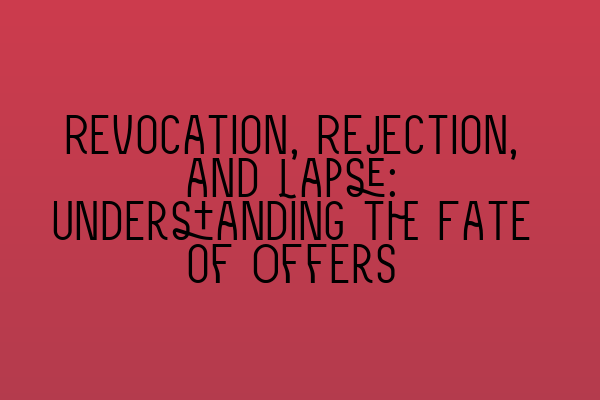Revocation, Rejection, and Lapse: Understanding the Fate of Offers
In the world of contract law, offers play a crucial role. An offer is defined as a proposal made by one party (the offeror) to another party (the offeree) with the intention to create a legally binding agreement. However, not all offers are set in stone. There are instances where an offer may be revoked, rejected, or simply lapse. Understanding the fate of offers is essential for both solicitors and individuals involved in contract negotiations. In this article, we will delve into the intricacies of revocation, rejection, and lapse.
Revocation of an offer occurs when the offeror withdraws the offer before it is accepted by the offeree. The general rule is that an offer can be revoked at any time before it is accepted, even if the offeror has promised to keep the offer open for a certain period. However, there are exceptions to this rule. For example, if the offeree has paid consideration to keep the offer open (known as an option contract), the offeror cannot revoke the offer during the specified period.
It is important to note that revocation of an offer must be communicated effectively to the offeree. Mere intention to revoke is not enough; the offeror must notify the offeree of the revocation by means of direct communication, such as through email, letter, or in person. It is recommended to have clear and unambiguous communication to avoid any confusion or disputes.
On the other hand, rejection of an offer occurs when the offeree declines the offer. Rejection can be explicit, such as through a written statement or verbal communication, or implicit, such as by offering a counter-proposal. Once an offer is rejected, it is no longer valid and cannot be accepted at a later time. The offeree may, however, choose to make a new offer if they wish to continue negotiations.
Lapse of an offer happens when the offer is not accepted within a certain period or within a reasonable time if no specified period is given. The duration of an offer may be expressly stated by the offeror or implied based on the circumstances. If the offeree fails to accept the offer within the specified time or within a reasonable time, the offer lapses and becomes void. It is important to note that a counter-offer by the offeree also amounts to a rejection of the initial offer, resulting in its lapse.
Understanding the fate of offers is crucial for both parties involved in contract negotiations. For offerors, it is important to be aware of their rights to revoke an offer and to communicate the revocation effectively. For offerees, it is essential to promptly respond to offers to avoid their lapse.
As a solicitor, it is your role to guide your clients through the intricacies of offer revocation, rejection, and lapse. Providing proper legal advice and ensuring that your clients are aware of their rights and obligations can help prevent potential disputes and ensure smooth contract negotiations.
If you would like to further enhance your knowledge and preparation for contract law, consider taking advantage of the SQE 1 Practice Exam Questions and the SQE 1 Practice Mocks FLK1 FLK2 provided by SQE Contract Law. These resources will test your understanding of contract law concepts and help you prepare for the SQE 1 exam.
Additionally, if you are preparing for the SQE 2 exam and want to further enhance your knowledge and skills in contract law, SQE Contract Law offers comprehensive SQE 2 Preparation Courses. These courses will provide you with the necessary tools and insights to excel in contract law and other areas tested in the SQE 2 exam.
It is important to stay updated on important dates and deadlines related to the SQE exams. You can find a comprehensive list of SRA SQE Exam Dates on our website, ensuring that you stay ahead and plan your preparation accordingly.
In conclusion, revocation, rejection, and lapse are essential concepts to understand when dealing with offers in contract law. As a solicitor, it is crucial to guide your clients through these concepts to ensure smooth negotiations and avoid potential disputes. By staying informed and continuously enhancing your knowledge and skills, you can excel in contract law and provide the best possible legal advice to your clients.
